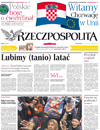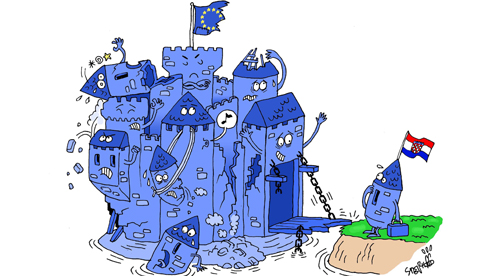Croatia's entry into the EU is a clear sign of the vitality of the European ideal, says Polish daily Rzeczpospolita. The paper notes that –

Despite all its problems, Europe is still growing and developing. This experiment, consisting of the evolution of the ideal of European solidarity from the European Coal and Steel Community to a modern universalism remains an important lesson for the region and the rest of the world. Croatia within Brussels’ orbit also means more security in Europe and a step towards disarmament of one of the most volatile parts of the continent
Croatia, recalls Dutch daily Trouw, is the "second splinter from the former Yugoslavia to become a member of the EU," after Slovenia in 2004 –
Thus the terrible Yugoslav crisis, which erupted a quarter of a century ago and which cost many lives in the heart of Europe, has ended. As was the case previously, when the Iron Curtain was raised, this leads to the integration of central and east European States. [...] The EU itself senses that each enlargement is not necessarily an improvement. But this does not diminish the historical significance of the movement which began with six countries on a destroyed continent and which now includes nearly 30 countries that are no longer each other's enemies.
"In the midst of a Eurosceptic wave," the entry of Croatia is a sign that "the EU's power of attraction remains, despite the crisis and the rise of nationalistic sentiments," says French financial daily Les Echos. The paper warns, however, against "the pitfalls of an XXL Europe" –
We know that this enlargement is probably not the last. [...] At 27, Europe is already largely ungovernable. [...] How will it, tomorrow at over 30, manage to make its voice heard when facing the United States, China, Russia or even India. [...] The European Union must finally decide to set its borders and to redefine its reason for being.
For Spanish daily El País,, Croatia's entry shows that "one finds more faith in Europe outside of it than within its borders" thus confirming "the existence of a constant demand for Europe". But, the paper adds that now –
Any new enlargement must be accompanied, or preceded, by the lifting of the unanimity requirement for key votes because the right to a veto paralyses the decision-making process of such a large club. Europe must think of its own interests. The first of which, if it is not to disappear, is to avoid complicating the decision-making process.
"Croatia enters the EU, frustration remains," notes Romanian daily Adevărul. The paper notes that –
This event arrives right at a time when the British are ever more convinced that they should exit the EU, when the Greeks discover that gifts come with a high rate of interest and when the Romanians and Bulgarians are realising that the streets of western capitals are not paved with gold.
In Lisbon, Portuguese daily Público warns against this "European illusion". The paper highlights the context of the crisis in which Croatia is joining the EU and notes that –
Angela Merkel, while pushing for national public expenditure restraint in Brussels, will have to watch some €14bn drain out of European coffers and go to Croatia to fund Croatian development projects scheduled until 2020. In the meantime, Slovenia, right next door, who entered the "club" in 2004, is fighting to avoid asking for a bailout to prevent it going bankrupt. [...] Nobody knows whether the Union that will survive will be the one for which its founders fought. Let’s hope, at least, that it does not reveal itself to be an illusion.
As for German daily Die Tageszeitung, it deplores the absence of the German Chancellor at the entry ceremonies organised to start in Zagreb on June 30. Striking a humorous note, the paper considers that –
The Croatians are the Kings of Fools among EU citizens because their most powerful ally sent the least well-known member of the German government [Michael Link, Under-Secretary for Foreign Affairs] to participate in the most grandiose festivities ever organised by the Croatian State. Yet, they have already allowed Deutsche Telekom into their country, even before expelling the Serbs. Furthermore, streets and squares have been named after Hans-Dietrich Genscher [a former German Foreign Minister] and for Helmut Kohl [...] and they even apologised for having defeated the Germans 3-0 in the 1998 Football World Cup, and now they are treated like the greatest of idiots.
Do you like our work?
Help multilingual European journalism to thrive, without ads or paywalls. Your one-off or regular support will keep our newsroom independent. Thank you!

















